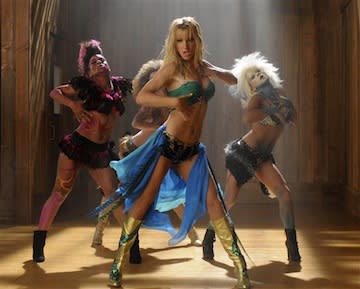 The Lookout
The LookoutParents’ group scolds TV shows for sexualizing young girls

In a raft of prime-time TV shows, underage girls are depicted in a higher percentage of sexual situations than adult women, according to a new report by a watchdog group of parents.
The study from the Parents Television Council focused on the 25 network TV shows that are most popular among children 12 to 17 years old, among them "The Office," "NCIS," "Two and a Half Men," "The Vampire Diaries," "Grey's Anatomy," "Desperate Housewives," "Lost," "Family Guy," "House," "Glee," "American Dad" and "The Simpsons."
Underage characters were sexualized at a higher rate than adult women characters in the shows, the study found, and the majority of the underage instances involved "suggestive dancing, erotic kissing, erotic touching and/or implied intercourse," while adult women were more often sexualized by comments and jokes from other characters. Parents Television Council spokeswoman Melissa Henson explains that the report aims to "bring pressure . . . on people who are responsible for creating entertainment products that sexualize young girls," while also hoping to "stigmatize" the practice. Past studies of the content of media productions haven't made much headway in achieving such goals, but the PTC is looking to use the study as the point of departure in "a national dialogue" on the issue.
In that vein, the group's website features a video montage of shame to point out some sexual scenes it objects to, with many scenes from the episode of the Fox teen hit "Glee" featuring Britney Spears making the cut. (The PTC earlier slammed the show's stars for posing in a suggestive GQ spread.)
Henson said in an interview with The Lookout that in more than 70 percent of instances where underage girls were sexualized in the 35 hours of television the group studied, the audience is expected to laugh.
"I think the concern there is that when they play it off as a laughing matter ... it makes it seem less serious, less harmful than it actually is," she says. "We know from the [American Psychological Association] report on the sexualization of girls that when girls are sexualized, it really can have devastating effects on their lives."
The 2007 APA report found that sexualization can contribute to eating disorders, low self-esteem and other problems in girls, which inspired the PTC to examine popular television shows.
Henson also singled out the CBS show "Two and a Half Men" for its lack of developed women characters. "Most of the women are sort of utterly forgettable -- they're there just for an episode or two as a sexual plaything for either Charlie or Allen and then they're gone," she says. "They're reducing women to sexual objects."
Henson says the argument that the shows are just being realistic in their treatment of teen sexuality doesn't hold water.
"Television is profoundly influential, so it's a chicken or egg argument: Is TV this way because it's reflecting reality or is reality this way because it's reflecting TV? Girls do not seek to be sexually objectified," she said.
The group's findings are already drawing critics. TV writer Chris Kelly argues in the Huffington Post that because the study is limited to examining 35 hours of TV, its results aren't to be trusted. He also argues that the study's definition of sexualizing scenes is overly broad.
The study separated out "healthy sexuality" from the definition of "sexualization." So if a sexual scene shows two people bonding and in the context of a relationship, the study did not categorize the scene as the sexualization of a female character. When a woman character's value was shown to be drawn from her sexual behavior, the study flagged the scene as sexualizing.
So far, Henson says, they have not received a response from the networks.
(Glee's Britney Spears episode: AP.)
